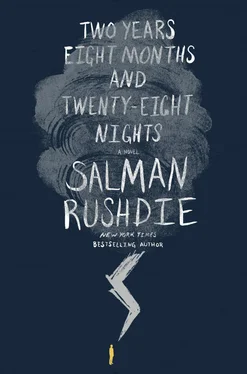The floating was not a puzzle to a jinnia princess. This had to be the work of Zabardast the sorcerer jinni. Zabardast had slipped through the first slits to reopen and cursed Geronimo Manezes: but why? That was a mystery. Was this random malice, or had Zabardast somehow intuited the existence of the Duniazát and understood that if properly marshaled they might prove to be an obstacle to the power of the dark jinn, a resistance, a counterforce? Dunia did not believe in chance. The jinn believe in the purposive nature of the universe, in which even the random has a goal. She needed to answer the question of Zabardast’s motives, and in time she found what she needed, she learned about Zabardast’s plan to spread the dual diseases of rising and crushing which would, once and for all, remove humanity from the surface of the earth. In the meanwhile, however, she was impressed by Geronimo Manezes’s resistance to the spell. Ordinary men would simply have floated off into the sky to die, suffocated for lack of oxygen, frozen by the low temperature, attacked by territorial birds incensed by a land creature’s elevation into the air. But here was Geronimo, after quite a while, still only a relatively small distance off the ground, still able to occupy interiors and perform his natural functions without leaving a humiliating mess. This was an individual to admire, she thought. A tough customer. But mostly she was distracted by that face. She had not thought to see that face again.
Ibn Rushd caressing her body had often praised its beauty to the point at which she grew irritated and said, You do not think my thoughts worth praising, then. He replied that the mind and body were one, the mind was the form of the human body, and as such was responsible for all the actions of the body, one of which was thought. To praise the body was to praise the mind that ruled it. Aristotle had said this and he agreed, and because of this it was hard for him, he whispered blasphemously in her ear, to believe that consciousness survived the body, for the mind was of the body and had no meaning without it. She did not want to argue with Aristotle and said nothing. Plato was different, he conceded. Plato thought the mind was trapped in the body like a bird and only when it could shed that cage would it soar and be free.
She wanted to say, I am made of smoke. My mind is smoke, my thoughts are smoke, I am all smoke and only smoke. This body is a garment I put on, which by my magic art I have made capable of functioning as a human body functions, it’s so biologically perfect that it can conceive children and pop them out in threes, fours and fives. Yet I am not of this body and could, if I chose, inhabit another woman, or an antelope, or a gnat. Aristotle was wrong, for I have lived for aeons, and altered my body when I chose, like a garment of which I had grown tired. The mind and body are two, she wanted to say, but she knew it would disappoint him to be disagreed with, so she held her tongue.
Now in Geronimo Manezes she saw Ibn Rushd reborn and wanted to murmur, You see, you have entered a new body as well. You have moved through time, down the dark corridor that some say the soul travels between lives, shedding its old consciousness as it goes, relieving itself of its selfhood, until finally it is pure essence, the pure light of being, ready to enter another living thing; and nobody can deny that here you are again, different, yet the same. Imagine that you came into the world blindfolded, in the dark, and floating in the air, just as you are now. You would not even know you had a body and yet you would know that you were you. Your selfhood, your mind, that would be there as soon as you were conscious. It is a separate thing.
But, she thought, arguing with herself, maybe it’s not so. Maybe it is different with human beings, who cannot change their form, and this sleeping figure’s echo of a man long dead can be ascribed to a freak of biology and nothing more. Maybe in the case of true humans, their mind, their soul, their consciousness flows through their bodies like blood, inhabiting every cell of their physical being, and so Aristotle was right, in humans the mind and body are one and cannot be separated, the self is both with the body and perishes with it too. She imagined that union with a thrill. How lucky human beings were if that was the case, she wanted to tell Geronimo who was and was not Ibn Rushd: lucky and doomed. When their hearts pounded with excitement their soul pounded too, when their pulses raced their spirits were aroused, when their eyes moistened with tears of happiness it was their mind that felt the joy. Their minds touched the people their fingers touched, and when they in turn were touched by others it was as if two consciousnesses were briefly joined. The mind gave the body sensuality, it allowed the body to taste delight and to smell love in their lover’s sweet perfume; not only their bodies but their minds, too, made love. And at the end the soul, as mortal as the body, learned the last great lesson of life, which was the body’s death.
A jinnia took human form but the form was not the jinnia and so it could not taste or smell or feel, and her body was not made for love because it was not the symbiotic partner and possessor of the mind. When the philosopher touched her intimately it was as though someone were fondling her while she was dressed in heavy winter garments, many-layered, so that she felt no sensation except a distant susurration, as if of a hand brushing an overcoat. But she had loved her philosopher so strongly that she had made him believe that her body was aroused and ecstatic. Ibn Rushd had been fooled. Men were easily deceived in such matters because they wanted to believe they had the power to arouse. She wanted to make him believe he pleased her. But the truth was that she could give physical pleasure to a man but not receive it, she could only imagine what such pleasure might be like, she could watch and learn, and offer up to her lover the outward signs of it, while trying to fool herself, as well as him, that yes, she was being pleasured too, which made her an actress, a phony, and a self-deceiving fool. Yet she had loved a man, had loved him for his mind and put on a body so that he could love her back, she had borne his children, and carried the memory of that love down eight centuries and more, and now, to her surprise and excitement, here he was, reborn, given new flesh, new bones, and if this floating Geronimo was old, what of it? Ibn Rushd too had been “old.” Human beings, brief candles that they were, had no idea what the word meant. She was older than both these men, so much older that it would horrify them if she aged as humans do.
She remembered the dinosaurs. She was older than the human race.
The jinn rarely admitted to one another how interested they were in human beings, how fascinating the human race actually was to those who were not human. Yet in the time before Man, in the age of the first single-cell organisms, the fishes, the amphibians, the first walking creatures, the first flying things, the first things that slithered, and then the ages of the larger beasts, the jinn rarely ventured forth from Fairyland. The earthly jungle, the desert, the mountaintop, these savage things were of no concern. Peristan revealed the obsession of the jinn with the patterning of things which only civilization provides; it was a place of formal gardens, elegantly terraced, with cascading streams of water, neatly channeled. Flowers grew in flower beds, trees were planted symmetrically to create pleasing avenues and clusters, to provide easeful shade and a sense of gracious amplitude. There were pavilions of red stone in Fairyland, many-cupolaed, with silken walls within which could be found the carpeted boudoirs, with bolsters to lie against and handy samovars of wine, where the jinn retired for pleasure. They were made of smoke and fire, yet they preferred shapely things to the formlessness of their natures. This led them frequently to take human form. This fact alone revealed the degree of — yes! — their indebtedness to poor, mortal humanity, which provided them with a template, helping them to impose physical, horticultural, architectural order upon their essentially chaotic selves. Only in the act of sex — the major activity of Fairyland — did the jinn, male and female, abandon their bodies and fall into one another as essences, smoke entwining fire, fire billowing smoke, in long ferocious union. Otherwise, they had actually come to prefer to use their “bodies,” the shells in which they cased their wildness. These “bodies” formalized them, much as the formal garden formalized the wilderness. “Bodies,” the jinn agreed, were good.
Читать дальше












